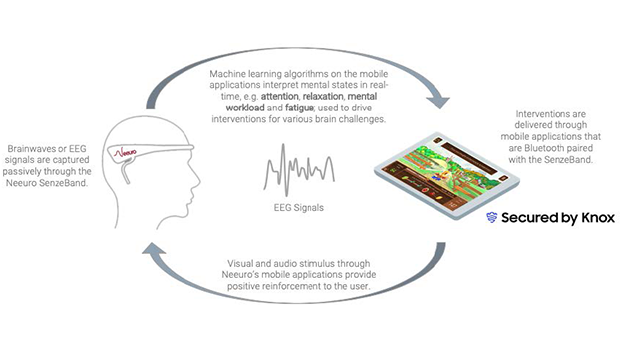
• Researchers at IMH, Duke-NUS and A*STAR have developed an advanced brain-computer interface technology that harnesses machine learning to personalise brain-training for children with ADHD.
• Partnering local tech start-up, Neeuro, the researchers are rolling out a pilot home-based intervention programme for children with ADHD undergoing treatment at IMH. The take-home kit comprises a wireless headband and a Samsung tablet with the pre-loaded game.
• Extensive clinical testing through a large-scale randomised clinical trial of the game-based brain-training programme found improvements in the attention span of children with ADHD.
A first-of-its-kind personalised, interactive brain-training game will soon be helping children with Attention Deficit Hyperactivity Disorder (ADHD) improve their attention span. The unique selling point of this technology is that children with ADHD can participate in this programme from home. A pilot run for the home-based programme will be launched for 20 children, aged 6-12 years, who are currently receiving treatment for ADHD at the Institute of Mental Health (IMH).
The game, called CogoLand1, was developed through a decade’s worth of extensive research, utilising Brain-Computer Interface (BCI) technology that incorporates machine-learning algorithms to personalise attention training, with the hope of complementing mainstay ADHD treatment. The use of CogoLand to complement ADHD treatment is the result of a collaboration between IMH, Duke-NUS Medical School and A*STAR’s Institute for Infocomm Research (I2R). Neeuro Pte Ltd, a local tech startup and spinoff from A*STAR, is the current sole licensee of the technology.
This non-invasive ADHD intervention programme was the subject of a large scale randomised clinical trial funded by the National Medical Research Council, involving 172 children with ADHD in Singapore.2 Associate Professor Lee Tih Shih, from Duke-NUS’ Neuroscience and Behavioural Disorders programme and Principal Investigator of the large scale clinical trial, commented: “Our patented, personalised intervention using advanced BCI technology has shown very promising and robust results, and we hope it can benefit many children with ADHD in the future.”
Furthermore, Functional Magnetic Resonance Imaging (fMRI) scans of a subset of the children, led by Associate Professor Juan Helen Zhou, also from Duke-NUS, showed positive post-training effects observed in brain areas associated with attention and task-orientation.3 The patented technology was summarised by Professor Guan Cuntai, technical lead of the system and scientific advisor to Neeuro: “Our technology can accurately quantify a person’s attention level in real-time using a machine learning algorithm and, from there, develop a unique patented personalised training programme using a feed-forward concept for cognitive training. Further improvements have been made in recent iterations by capitalising on the latest deep learning approaches with our large dataset.” Professor Guan was also the Principal Scientist who led the BCI research when he was part of A*STAR’s I2R.
Dr Lim Choon Guan, Deputy Chief of the Department of Developmental Psychiatry at IMH said: “While medication and behavioural therapy are effective in treating symptoms of ADHD in children, some parents are also keen to explore other approaches that can help their children to improve their concentration. After a decade of collaborative work, our team is very excited to pilot this home-based brain-training game which parents can use to help their children regulate themselves.” The home-based programme will see the 20 children each receive a take-home kit that includes Neeuro’s brainwave-reading SenzeBand and a Samsung tablet with the preloaded CogoLand game, which they will use following a prescribed regimen for the duration of the programme. This approach is intended to be a complement and/or supplement to conventional ADHD treatment.
According to Dr Alvin Chan, CEO and Co-Founder of Neeuro, “At Neeuro, our aim is to utilise technology to enable positive change in the neurological agility and fitness of our users. We are privileged to be working with institutions such as IMH, Duke-NUS and A*STAR, in conjunction with our hardware partner Samsung, to explore the use of cutting-edge technology in order to achieve this aim. It is our hope that this trial paves the way to enable the progressive development of new complementary options that will bring about positive outcomes for the millions of children afflicted with ADHD globally, especially those in Singapore.”
Mr Philip Lim, CEO of A*STAR’s innovation and enterprise office A*ccelerate, said: “It is always fulfilling when homegrown technologies are translated into meaningful outcomes. We are proud to be a part of Neeuro’s journey, and A*STAR will continue supporting entrepreneurial companies like them to grow and innovate.”
1 See Annex A for more information on CogoLand.
2 Lim, C., Poh, X., Fung, S., Guan, C., Bautista, D., & Cheung, Y. et al. (2019). A randomized controlled trial of a brain-computer interface based attention training program for ADHD. PLOS ONE, 14(5), e0216225. DOI: 10.1371/journal.pone.0216225
3 Qian, X., Loo, B., Castellanos, F., Liu, S., Koh, H., & Poh, X. et al. (2018). Brain-computer-interface-based intervention re-normalizes brain functional network topology in children with attention deficit/hyperactivity disorder. Translational Psychiatry, 8(1). DOI: 10.1038/s41398-018-0213-8
Note: The research study was funded by grants from the National Medical Research Council (NMRC) and National Healthcare Group (NHG). The research team also acknowledges the support received from the Ministry of Education, Singapore.













 Get it on Google Play
Get it on Google Play